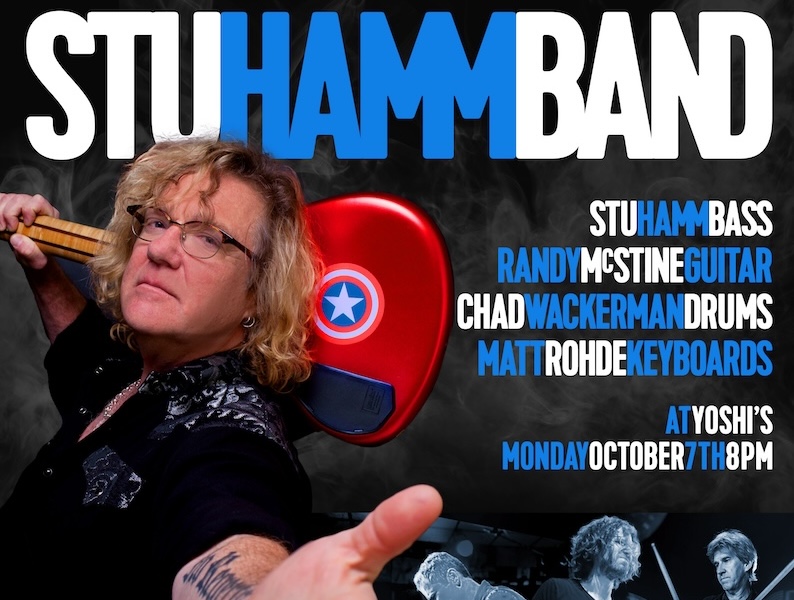
Mon October 7, 2024
Legendary bassist known for his work w/ Steve Vai & Joe SatrianiSTU HAMM BAND
Doors: 7:30 PM Show: 8:00 PM
Stuart Hamm is perhaps best known for his recording and touring roles with guitar legends such as Steve Vai and Joe Satriani. However, for serious students of the electric bass, Hamm’s influence and impact on the instrument are far more extensive. Regarded as one of the most technically gifted bassists to have emerged out of the jazz/rock genre in the last thirty years, Hamm has released a string of impressive solo albums, along the way becoming an ambassador for virtuoso bass playing through his mastery of slap and pop techniques and his pioneering work with two handed tapping and solo bass playing. He has also released several successful tuition videos, beginning with Slap, Pop and Tap for the Bass in 1988 and his more recent series of videos for his Truefire ‘Stu U’ course.
A graduate of the prestigious Berklee College of Music, Hamm has been awarded the schools ‘Distinguished Alumni Award’. Stuart Hamm was born in New Orleans on 8th February 1960. His family were all musically inclined: his father was a musicologist and his mother an opera teacher, whilst his brothers listened to an eclectic mix of artists including The Mahavishnu Orchestra, Pink Floyd, Miles Davis and Maynard Ferguson, all of which made for an ideal environment for a young musician. Stuart began his own musical journey by studying the flute and the piano and developed a fondness for classical music. He began playing the bass in 1973 while at high school and initially taught himself from Mel Bay tuition books. Before long he was working in the school jazz band and studying the recordings of bass legends such as Stanley Clarke, Chris Squire, Jeff Berlin and Jaco Pastorius.
In 1978 he enrolled at Berklee College of Music where he began studying alongside guitarist Steve Vai. It was during this period that he began experimenting with ways to play classical piano music on the bass. The result of these efforts was his development of the two handed tapping technique, which he learned to use to perform complex piano compositions such as Debussy’s ‘Dr. Gradus Ad Parnassum’, Bach’s ‘Prelude in C’ and Beethoven’s ‘Moonlight Sonata’. During this time, he also studied the work of funk bassist Larry Graham and before long had mastered the slap and pop technique. He would eventually incorporate techniques of his own - such as the ‘flamenco rake’ - into his slap playing.
Alongside his studies, he and Steve Vai played together in various bands such as Axis and The Out Band before Steve decided to relocate to California. Stuart followed, forming a new band with him called The Classified and playing on his first two albums Leftovers and Flex-able. In the late eighties Stuart approached Relativity Records with some demos of his music. He was offered a small record deal, leading to the release of his debut album Radio Free Albemuth in 1988. The album contained tracks such as ‘Sexually Active’ and ‘Country Music (A Night in Hell)’ - both of which are excellent demonstrations of his mastery of slap and tap techniques. It also featured two of his arrangements of classical piano pieces, Debussy’s ‘Dr. Gradus Ad Parnassum’ and Beethoven’s ‘Moonlight Sonata’. Both are complex and fascinating examples of the kind of music that can be played on the bass using the two handed tapping technique. The album is also notable for the track `Flow My Tears’, a slow ballad that featured Stuart’s two handed tapping style in accompaniment form, before he cuts loose on an amazing solo section where he plays arpeggiated chordal passages and a melody line all at once. Although he had intended for the main melody line on this song to be played by a trumpet, his limited recording budget made this impossible. Instead, the record label suggested he use one of their newly signed artists, a guitarist named Joe Satriani. Joe played on the track, in return for Stuart playing on his album, Flying in a Blue Dream. He was subsequently offered the bass player position in Joe’s band and toured in support of the album. The tour offered Stuart ample opportunity to shine as both a supportive bassist and soloist and allowed him to showcase his abilities to a larger audience.
Stuart followed the success of his debut album by recording a tuition video for Hot Licks. The video, entitled Slap, Pop and Tap for the Bass was aimed at experienced players and as the title suggests, focused on slapping and two handed tapping. Many of the pieces from his debut album were examined and dissected, as well as his popular arrangement of the Peanuts theme (Vincent Guaraldi’s ‘Linus & Lucy’). The video did much to boost Stuart’s profile amongst bass players and even today - nearly thirty years after its release - it remains one of the best resources for studying these advanced techniques.
Stuart followed his debut album with Kings of Sleep in 1989. Featuring a strong collection of bass-heavy jazz-rock tunes, as well as an arrangement of J.S Bach’s ‘Prelude in C’, the album is essential listening for Stuart’s fans. Highlights include ‘Black Ice’ with its thunderous detuned slap riff, the ‘Flow My Tears’ inspired ‘Surely the Best’, the hyperactive open string slap and pop of ‘Call of the Wild’ and the chops busting ‘Count Zero’, which features his flamenco rake slap technique. The album is also notable for the two handed tapping showcase ‘Terminal Beach’. Following Kings of Sleep, Stuart recorded a second Hot Licks instructional video, Deeper Inside the Bass. This time he focused on material from his second album, dissecting tracks such as ‘Count Zero’ and ‘Terminal Beach’. The video is also notable for his popular solo bass arrangement of ‘The Star Spangled Banner’, a piece which he has continued to play throughout his career.
Hamm’s third solo album, The Urge, was released in 1991. Seeking to evolve his sound, this time around he opted for a heavier rock approach, one inspired by his extensive touring with guitarist Joe Satriani. This was also the first album to feature his vocals, notably on songs such as ‘Who Do You Want Me to Be Today?’ and the title track. It was the bass-heavy instrumental pieces that hit the hardest however, with tracks such as ‘If You’re Scared, Stay Home’ (with its multiple bass tracks featuring some seriously funky slap and tap riffs) standing out in particular. The album also included a piece called ‘Quahogs Anyone?’ a live recording of his solo spot from a Satriani show, featuring excerpts from ‘Surely The Best’, ‘Peanuts’, ‘Count Zero’, ‘Sexually Active’ and ‘Country Music’. Following the release of The Urge, Hamm continued to tour with both Vai and Satriani.
In 1998 he formed GHS, a jazz-fusion trio with guitarist Frank Gambale and drummer Steve Smith. Their first album, Show Me What You Can Do was released in 1998 and featured some of Stuart’s strongest work to date, with tracks such as ‘Wrong & Strong’ and ‘Astral Traveller’ standing out in particular. A follow-up, The Light Beyond was released in 2000, followed by GHS3 in 2002.
In 2000 Stuart released his fourth studio album. Entitled Outbound, the album returned the emphasis to his bass playing, now set set against the contemporary rhythmic sounds of Youth Engine, who were credited with production and programming duties. Tracks such as ‘Outbound’, ‘The Castro Hustle’ and ‘The Tenacity of Genes and Dreams’ are impressive showcases for Hamm’s slap and tap techniques, whilst ‘Charlotte’s Song’ - a solo piccolo bass piece - and ‘A Better World’ demonstrated the more sensitive side of his compositional skills. Outbound also included the first recorded appearance of ‘The Star Spangled Banner’.
In 2006 Stuart put together BX3, a touring bass show that also featured fellow bassists Billy Sheehan and Jeff Berlin. With backing musicians Jude Gold on guitar and John Mader on drums, the BX3 show was a chance for fans to see three bassists in one gig. Each bassist had their own set, with encores - including Spinal Tap’s ‘Big Bottom’ played together. Stuart used the opportunity to play tracks from his entire career to date, including ‘Radio Free Albemuth’ and ‘Flow My Tears’ from his debut album and more recent material such as ‘Nostalgia’ and ‘Katahdin’, both of which he recorded with GHS. In 2007 he released a live album called Live Stu x2, a selection of tunes from two live shows, one a GHS show, the other a show played with his own band. Over the next few years Hamm found himself busy touring with Satriani, as well as working for an extended period in Teatro Zinzanni, a Cirque du Soleil-style theatre show.
Hamm’s fifth studio album, Just Outside of Normal arrived in 2010, a decade after his last solo outing. Recorded remotely using musicians from all over the world, the album was something of a departure from his established sound and saw him tackling a far wider range of musical genres, from Dixieland jazz to polka and rock boogie. Naturally there is still plenty for bass players to get their teeth into: the opening track ‘The Obligatory Boogie’ opens with a trademark Stuart Hamm slap figure which later develops into a series of blistering solo lines, whilst the ‘Country Music’ sequel ‘The Clarinet Polka’ features the intensive fingerstyle passages and tapping runs that have made Stuart a bass icon. Further bass highlights include the sliding harmonic chords found in ‘Windsor Mews’ and Uniformitarianism’ and the cover version of the Led Zeppelin classic ‘Going to California’, which Hamm has regularly performed as a solo piece. Compositionally, ‘Big Roller’, a quick-paced Dixieland tune featuring a lilting soprano sax melody and a supple swing groove, stands out as the most stylistically diverse tune on the album.
The Book of Lies, Stuart’s sixth studio album – and perhaps his most ambitious to date – was released in 2015. Although there are several ‘band’ songs, the album is fundamentally built around ‘Le Petit Suite for Solo Bass’, a seven song suite of solo pieces for the bass guitar. Growing up playing the flute and piano, Hamm had found no shortage of study pieces available for either instrument. Noticing a lack of similar resources for bassists - despite solo bass performance now being a popular genre for the modern player – he set out to write a suite of pieces that could be performed for auditions and at concert performances. Each piece certainly fulfills that role while also helping the student develop their technique in a specific area, whether it be chordal playing, using harmonics, or slapping and tapping. The full band pieces on the album also see Stuart stretching his compositional wings: the title track is a slice of greasy Meters-esque funk, whilst ‘Back to Shabalalla has a cheerful South African Highlife vibe. A laid-back cover of The Beatles’ ‘Lucy in the Sky with Diamonds’ closes the album. Stuart toured with a new band to support this album, featuring Alex Skolnick and Joel Taylor.